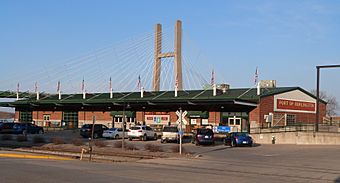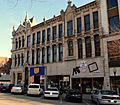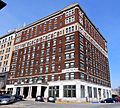Downtown Commercial Historic District (Burlington, Iowa) facts for kids
Quick facts for kids |
|
|
Downtown Commercial Historic District
|
|

Municipal River Terminal (1928) in 2013.
|
|
| Location | 100-800 blocks of Jefferson Street, plus parts of adjacent blocks east of 4th Street from Columbia to Market, Burlington, Iowa |
|---|---|
| NRHP reference No. | 14001168 |
| Added to NRHP | January 21, 2015 |
The Downtown Commercial Historic District is a special area in Burlington, Iowa, United States. It covers most of the main shopping and business part of the city. This district was added to the National Register of Historic Places in 2015. This means it's recognized as an important historical place.
The district includes 65 buildings that were looked at between 2012 and 2013. It also has buildings from two other historic areas: the West Jefferson Street Historic District and the Manufacturing and Wholesale Historic District. In total, there are 122 important buildings in this district. Most of these buildings (108) are considered "contributing properties." This means they help show the history and character of the district.
Contents
How Downtown Burlington Grew
The downtown area of Burlington grew in three main stages. Each stage brought different changes to the city.
Early Growth (1865-1894)
This first period was a time of great success for Burlington. It happened after the American Civil War. During these years, the city's connections to railroads grew a lot. This made Burlington an important place for trade and business. Many new buildings were constructed during this busy time.
Modern Buildings Arrive (1895-1929)
The second period saw downtown Burlington become more modern. This is when the city's "tall" buildings were constructed. These taller buildings changed the look of the downtown area. They showed that Burlington was growing and becoming a major city.
Facing New Challenges (1930-1967)
In the third period, downtown Burlington faced new challenges. More people started to shop in new areas, especially in West Burlington. City leaders worked hard to keep old businesses and bring in new ones. They also tried to make the downtown area more modern and better for everyone.
Why West Jefferson Street is Important
The West Jefferson Street Historic District is a key part of this downtown area. It was the main road in the late 1800s and early 1900s. This street led from the main business area near the Mississippi River. It then went west out of town towards Agency Road.
What the Buildings Look Like
Most buildings in the district were used for businesses. These included shops, banks, and offices for professionals. Government buildings are mostly found in other parts of the city.
Building Heights and Materials
The taller buildings are mostly on the east side of Jefferson Street. They are also found on the blocks next to it. Most buildings are three or four stories tall. The very tallest buildings reach eight or nine stories high. There are also many smaller buildings with one or two stories. Most of these buildings are made of brick.
Architectural Styles Over Time
The older buildings from the first period often show the Italianate style. They also feature the Romanesque Revival style. These styles have unique decorative details.
The taller, more modern buildings from the second period often use the Neoclassical style. This style often looks grand and uses elements from ancient Greek and Roman buildings.
Buildings from the third period have simpler, more modern styles. These styles focus on clean lines and less decoration.
Cool Buildings to See
-
Capitol Theater (1937)













